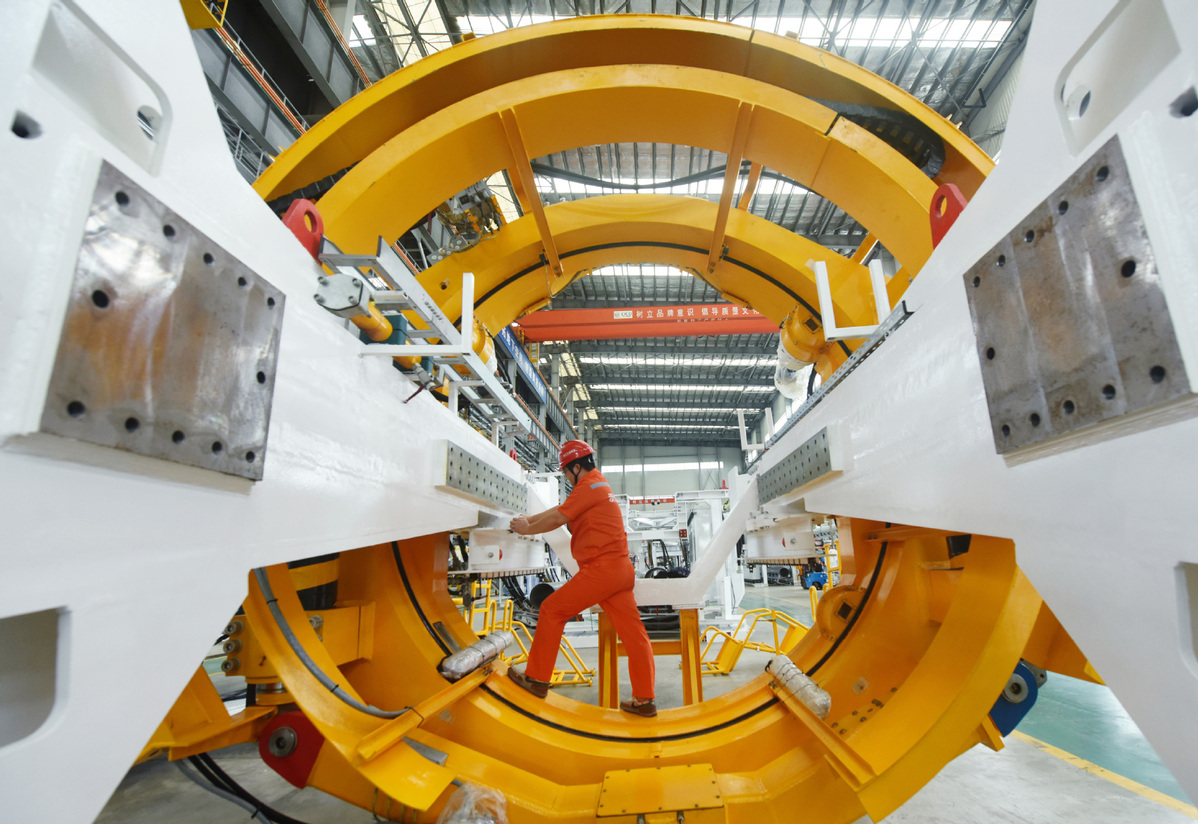- 乔布斯传 18分钟前第717期:Flash 应用程序商店以及控制(3)
- 跟着Gwen 54分钟前第1503期: 我并非生来就战无不胜,但我一直心怀梦想,
- 冰与火之歌之 58分钟前第939期:权力的游戏提利昂(07)
- 英国卫报 1小时前黑石集团:房地产投资帝国是如何缔造的?(2)
- 2022年英 1小时前气候活动人士又向名画下手
- 立体语音 1小时前第733期:Still Too Dear还是太贵
- 英文小酒馆 1小时前第409期:上国际学校,家里要有矿吗?
- Gabby英 1小时前Gabby英语早读——法律系统
- 瞬间秒杀听力 1小时前第964期:Getting Internet Servi
- 早安英文 1小时前第1300期:日本最厉害的女摄影记者,活了一个多世纪,「
- 经济新闻 1小时前一系列稳经济举措将在四季度集中显效
- 新增节目
- 最近更新
- 18分钟前第717期:Flash 应用程序商店以及控制
- 23小时前FTX破产波及百万债权人
- 1天前英法签署协议 打击非法移民
- 3天前小蓝鸟与大老板(下)
- 4天前小蓝鸟与大老板(上)
- 5天前科技股现在划算吗?(下)
- 5天前科技股现在划算吗?(上)
- 6天前外来入侵物种是否能对生态环境有利(下)
- 7天前外来入侵物种是否能对生态环境有利(上)
- 7天前Meta宣布裁员1.1万人
- 最近更新
- 3天前第969期:“做美甲”的地道表达?
- 6天前第968期:Visiting A Farm参
- 12天前第967期:生活需要“翻页”Turn ove
- 17天前第966期:生活实用英文对话Winter C
- 24天前第965期:Cut it Out!可不是“把
- 10-21第964期:搬家Moving
- 10-17第963期:Get on the Rolle
- 10-08第962期:在药店买药At the Phar
- 09-22第961期:在机场托运行李
- 09-19第960期:Getting A Haircu
- 最近更新
- 1天前美国新国会形成"分裂"格局
- 1天前导弹落入波兰境内致2人死亡
- 3天前美国民主党和共和党可能会在"欢乐时光
- 3天前"have a monkey on
- 4天前全球人口达到80亿
- 4天前全球结核病患者人数近年来首次上升
- 5天前美国发现挑战者号航天飞机的大块残骸
- 6天前"95后"进入美国国会
- 8天前美国强力球开出20.4亿美元巨奖
- 8天前美国堕胎裁决导致更多女性选民参加中期选举
- 影视·英语 进入频道>>
- 06-01温馨电影《千与千寻》第14期:白龙还活着?(en
- 05-31温馨电影《千与千寻》第13期:送回人类世界
- 05-30温馨电影《千与千寻》第12期:我们还会再见吗?
- 05-29温馨电影《千与千寻》第11期:婆婆会杀了你的
- 05-28温馨电影《千与千寻》第10期:不吃东西会消失的
- 05-27温馨电影《千与千寻》第9期:有入侵者
- 11-17听歌学英语:王朝Dynasty
- 11-16听歌学英语:胡思乱想Heads in the Clo
- 11-15听歌学英语:沙滩飞雪Snow on the Beac
- 11-14听歌学英语:英雄Hero
- 11-13听歌学英语:如此遥远So Far Away
- 11-12听歌学英语:相思Lovesick
- 11-11听歌学英语:支离破碎All Falls Down
- 11-10听歌学英语:我多么希望I Wish
- 11-09听歌学英语:热恋男女Take It off
- 11-08听歌学英语:(撕心裂肺的)他们没我了解你They D
- 11-07听歌学英语:我很幸福I'm Happy
- 11-06听歌学英语:甜蜜时光Sweet Time
- 最近更新
- 10-232019年12月英语六级考试真题试卷附答案(完整
- 10-232019年12月英语六级考试真题试卷附答案(完整
- 10-212019年12月英语六级考试真题试卷附答案(完整
- 10-212019年12月英语六级阅读真题及答案 第3套
- 10-212019年12月英语六级阅读真题及答案 第3套
- 10-192019年12月英语六级阅读真题及答案 第3套
- 10-192019年12月英语六级阅读真题及答案 第2套
- 10-192019年12月英语六级阅读真题及答案 第2套
- 10-162019年12月英语六级阅读真题及答案 第2套
- 10-152019年12月英语六级阅读真题及答案 第1套
- 10-152019年12月英语六级阅读真题及答案 第1套
- 10-152019年12月英语六级阅读真题及答案 第1套
- 02-252021年英语专业四级听力真题 对话2
- 02-252021年英语专业四级听力真题 对话1
- 02-252021年英语专业四级听力真题 演讲
- 02-252021年英语专业四级听力真题 听写
- 06-01专四英语作文高分范文背诵(MP3+中英字幕)第6
- 05-31专四英语作文高分范文背诵(MP3+中英字幕)第6
- 11-21诗歌翻译: 古代名言(196)英文译文
- 11-21美国人权政治化行径毁损人权善治根基(4)(中英对
- 11-18诗歌翻译: 韩愈-《蓝田县丞厅壁记》英文译文
- 11-18美国人权政治化行径毁损人权善治根基(3)(中英对
- 11-17诗歌翻译:古代名言翻译(195) 英文译文
- 11-17美国人权政治化行径毁损人权善治根基(2)(中英对
- 11-16诗歌翻译:古代名言翻译(194) 英文译文
- 11-16美国人权政治化行径毁损人权善治根基(1)(中英对
- 11-15诗歌翻译:古代名言翻译(193) 英文译文
- 11-15美式民主的局限与弊病(3)(中英对照)
- 11-14诗歌翻译:王涯-《宫词三十首(录一)》英文译文
- 11-14美式民主的局限与弊病(2)(中英对照)
- 07-14商务英语活学活用 名片(4)
- 07-13商务英语活学活用 名片(3)
- 07-12商务英语活学活用 名片(2)
- 07-11商务英语活学活用 名片(1)
- 07-08商务英语活学活用 商务礼节(4)
- 07-07商务英语活学活用 商务礼节(3)
- 07-06商务英语活学活用 商务礼节(2)
- 07-05商务英语活学活用 商务礼节(1)
- 07-01商务英语活学活用 办公室里的咖啡和点心(4)
- 06-30商务英语活学活用 办公室里的咖啡和点心(3)
- 06-29商务英语活学活用 办公室里的咖啡和点心(2)
- 06-28商务英语活学活用 办公室里的咖啡和点心(1)
- 06-232014年9月北京市全国英语等级考试报名时间
- 08-23培养公共英语学习中的良好习惯
- 07-26江苏淮安2013年职称英语考试证书领取通知!
- 07-26湖北襄阳2013年职称英语考试证书领取通知!
- 07-169岁女孩10岁男孩口语满分过公共英语四级考试
- 07-16全国公共英语:等级考试技巧心得
- 07-16六招迎战PETS考试
- 07-16吉林2013年下半年公共英语等级考试费用
- 07-16安徽2013年下半年全国英语等级考试报名时间
- 07-12公共英语三级考试:完形填空题型不容忽视
- 07-12公共英语考试高分经验
- 07-12公共英语考试中所有英语介词的翻译技巧
- 07-02新东方GRE核心词汇考法精析 List31:Un
- 06-22GRE数值比较(官方题库Barron)每日一题
- 06-21GRE数值比较(官方题库Barron)每日一题
- 06-20GRE数值比较(官方题库Barron)每日一题
- 06-19GRE数值比较(官方题库Barron)每日一题
- 06-18GRE数值比较(官方题库Barron)每日一题
- 06-17GRE数值比较(官方题库Barron)每日一题
- 06-16GRE数值比较(官方题库Barron)每日一题
- 06-15GRE数值比较(官方题库Barron)每日一题
- 06-14GRE数值比较(官方题库Barron)每日一题
- 06-13GRE数值比较(官方题库Barron)每日一题
- 06-12GRE数值比较(官方题库Barron)每日一题
- 06-03雅思听力地名常见拼写错误
- 04-22雅思阅读填空题解题技巧归纳
- 04-16雅思听力标准—六大基本功
- 04-15三步走攻破雅思听力真题中的学术讨论题
- 04-092019雅思听力是不是变得更难了?
- 04-08雅思听力训练同义替换总结有多重要
- 04-052019雅思听力考试备考方向指导
- 04-04雅思听力复习方法:模拟训练
- 03-26雅思听力技巧"抢分"从这三方面入手
- 03-25雅思听力如何巧做选择题
- 03-19直击要害的雅思听力备考三大法则
- 03-18雅思写作模板之保护野生动物
- 12-08第59课 商务英文邮件之邮件咨询
- 12-07第58课 商务英文邮件申明需求
- 12-06第57课 商务英文邮件九大原则2
- 12-05第56课 商务英文邮件九大原则1
- 12-04第55课 英语电话之留存对方联系方式
- 12-01第54课 英语电话之给某人留电话
- 11-30第53课 英语电话之表达信号不好
- 11-29第52课 英语电话之交代来电事由
- 11-28第51课 英语电话之礼貌要求对方
- 11-27第50课 英语电话之向对方承诺传达到位
- 11-24第49课 英语电话之对方不方便应对
- 11-23第48课 英语电话之不方便接电话
































































